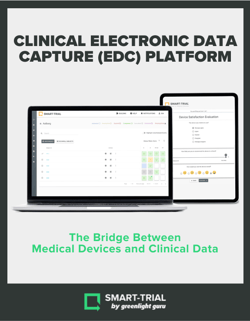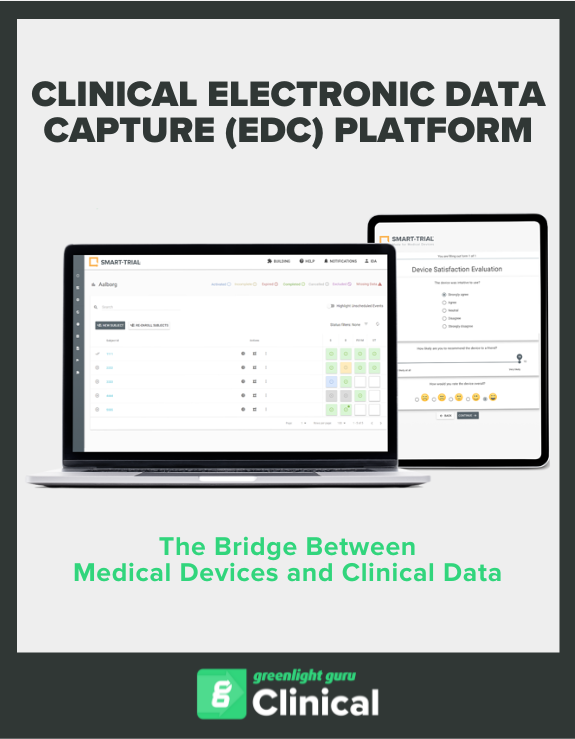Why Investigator Initiated Studies Alone Are Not the Solution for PMCF Under EU MDR
.png?width=860&height=430&name=Why%20Investigator%20Initiated%20Studies%20Alone%20Are%20Not%20the%20Solution%20for%20PMCF%20Under%20EU%20MDR%20(new).png)
The European Medical Device Regulation (EU MDR) requires medical device manufacturers to engage in post-market surveillance by establishing and implementing both a post-market surveillance plan (EU MDR Article 84) and a post-market clinical follow-up (PMCF) plan (EU MDR Annex XIV, Part B).
To comply with these requirements, medical device companies are leveraging every possible data source that can yield insights into the safety and efficacy of their products - including Investigator Initiated Studies (IIS).
But while Investigator Initiated Studies are a valuable source of clinical data with the potential to enhance patient care outcomes, it’s important that medical device companies don’t rely exclusively on data from IIS to meet their PMCF requirements under EU MDR - unless certain conditions can be met (more on this later).
In this blog, we’re taking a deep dive to explain if, when, and how medical device companies can use clinical data from Investigator Initiated Studies for their PMCF compliance needs.
What are Investigator Initiated Studies?
Investigator Initiated Studies (sometimes called Investigator Initiated Trials) are clinical studies initiated by one or more Investigators instead of by a Sponsor.
According to the EU MDR, an Investigator is an individual responsible for conducting a clinical investigation, while a Sponsor is an entity (e.g. individual, company, organization, etc.) responsible for initiating, managing, and financing the clinical investigation.
In an IIS, the Investigator(s) assumes the roles and responsibilities of both the Investigator and the Sponsor.
Who Can Launch Investigator Initiated Studies?
While the majority of medical device clinical studies are initiated by medical device companies, an IIS may be initiated by a researcher, academic, physician, healthcare institution, a cooperative group, or by a collaborative study group.
Clinicians may launch IISs to test a medical device for an alternative indication, compare the efficacy of two medical devices, or to compare the cost-effectiveness of two or more treatment plans involving a device.
What are the Benefits of IIS for Medical Device Companies?
Investigator Initiated Studies are massively beneficial for medical device manufacturers, patients, and for the healthcare industry as a whole.
Physicians often initiate studies to experiment with new indications or treatment protocols for a medical device that can enhance patient care outcomes and uncover new marketing opportunities for medical device companies.
IISs tend to enable medical device manufacturers with a low-cost source of clinical evidence, as the investigators are responsible for obtaining funding for the study along with other costly requirements (e.g. patient recruitment, administration, etc.) that would normally be fulfilled by a medical device company acting as Sponsor.
Investigator Initiated Studies in Post-Market Clinical Follow-up (PMCF)
Post-Market Clinical Follow-up (PMCF) is described in the EU MDR as a continuous process that updates the clinical evaluation of a medical device by proactively collecting and evaluating clinical data to:
- Confirm device safety and performance,
- Identify and monitor previously unknown side-effects and contraindications,
- Ensure the continued acceptability of identified risks,
- Detect emerging risks on the basis of factual evidence, and
- Identify possible systematic misuse or off-label use of the medical device.
It might seem like Investigator Initiated Studies would be useful as a source of clinical data for complying with PMCF requirements, but our knowledge of the EU MDR tells us that relying on IISs alone for PMCF is a disaster waiting to happen.
In particular, there are four special conditions that must be satisfied for Investigator Initiated Studies’ clinical data to be usable for PMCF compliance purposes:
1. Data Reflects Intended Use
The purpose of PMCF is to measure the performance and benefits of a medical device used on humans within its intended purpose. To support this objective, the data collected as part of an Investigator Initiated Study must mirror the data needed to demonstrate the efficacy of your device according to its intended use.
This requirement means that Investigator Initiated Studies, whose goal is to test a potential new indication or treatment plan for your medical device, may not be relevant to PMCF because they explore new research questions that are not relevant to the efficacy of your device when used as intended.
2. GCP and Regulatory Compliance
The EU MDR rules for clinical investigations state that Sponsors must appoint a monitor independent from the investigation site to ensure compliance with the EU MDR, clinical investigation plan (CIP), and the ISO 14155:2020 standard for Good Clinical Practice.
These rules apply to all clinical investigations conducted for PMCF - if an IIS doesn’t comply with these requirements, it can’t be used to support PMCF compliance. Investigators aren’t always knowledgeable or aware of ISO 14155:2020 requirements, resulting in the production of Investigator Initiated Studies that can’t be used to support PMCF compliance.
3. Document and Data Control Compliance
A critical aspect of compliance with ISO 14155:2020 is that the methods and tools used by Sponsor-Investigators for clinical data capture in Investigator Initiated Studies must comply with the document and data control requirements set forth in Section 7.8 of the standard.
Section 7.8.1 requires clinical investigators to ensure control and traceability over all documents produced, and Section 7.8.2 requires investigators to sign and date all CRFs with written explanations for any discrepancies.
Section 7.8.3 deals with requirements for electronic clinical data systems. To achieve compliance, investigators must
- Document written procedures that describe the validation, data collection, security, backup, and recovery of the system,
- Ensure that no data can be deleted from the system, and
- Ensure that any changes to data in the system can be followed via an audit trail.
IISs are often self-funded or publicly funded through grants, resulting in a study with a lower budget than a traditional clinical investigation sponsored by a medical device company.
Budgetary constraints sometimes compel investigators to save on up-front costs by using paper-based data collection methods instead of a software-based electronic data capture (EDC) system. This often results in document control/traceability issues and non-compliance with Section 7.8 of ISO 14155:2020.
4. Data Processing Consent
Investigators must obtain basic data processing consent from the subjects of an IIS, but this basic consent does not include permission for the manufacturer to receive, process, or analyze the clinical data.
Unless the participants in an IIS give their explicit consent, the Investigators in an IIS are prohibited by the European GDPR from sharing their data with manufacturers.
When Can You Use IIS for PMCF Compliance?
Investigator Initiated Studies continue to play an important role in identifying new indications for medical devices, and in the ongoing process of ensuring medical device safety and efficacy.
However, due to the requirements associated with data collection for PMCF reporting, medical device companies should not depend on IIS as the only avenue for PMCF data collection unless they can:
- Ensure that the clinical data (endpoints) collected in the study are sufficient to demonstrate safety and efficacy of the device based on its intended use,
- Verify the IIS as being compliant with the regulatory requirements of EU MDR, the CIP, and the ISO 14155:2020 Good Clinical Practices standard,
- Obtain the required data processing consent from IIS participants.
Achieve Data Collection Compliance for Investigator Initiated Studies with Greenlight Guru Clinical
Greenlight Guru Clinical is a software electronic data capture (EDC) system purpose-built and pre-validated to meet the compliance requirements for electronic clinical data systems.
Our EDC solution delivers out-of-the-box compliance with ISO 14155:2020, along with user-friendly eCRF design templates, GDPR-compliant data export, and support for many different study designs and protocols.
Interested in learning how Greenlight Guru Clinical works, and how you can use it to collect data for Investigator-Initiated Studies?
Book a customized demo with our team and we’ll show you how Greenlight Guru Clinical helps clinical investigators achieve seamless compliance with GCP and the EU MDR to deliver high-quality IISs that can support PMCF activities and requirements.
Jón Ingi Bergsteinsson, M.Sc. in Biomedical Engineering, is the co-founder of Greenlight Guru Clinical (formerly SMART-TRIAL). He was also the technical founder of Greenlight Guru Clinical where he paved the way for the platform’s quality standards, data security, and compliance.
Related Posts
Guidance on How to Conduct Clinical Investigations Under EU MDR
How to Design a Successful Post-Market Clinical Follow-Up (PMCF) Survey
Selecting The Ideal PMCF Activity
Get your free DEMO
Clinical Electronic Data Capture (EDC) Software






